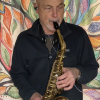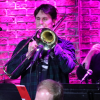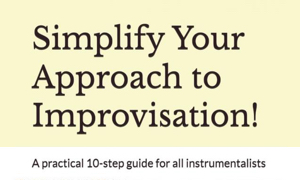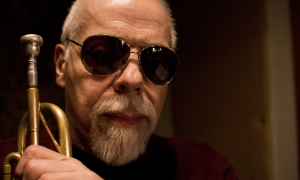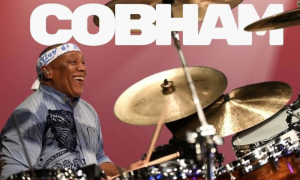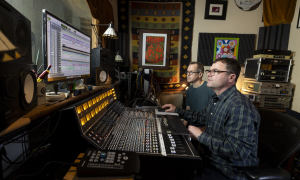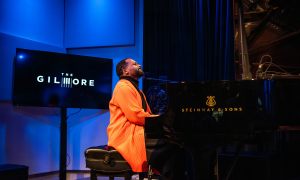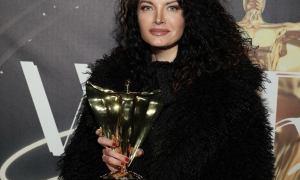Another brilliant blast of Anglophilia that transforms British invasion rock treasures into wildly inventive jazz vehicles.
Best known for his celebrated recordings and performances interpreting the ingenious compositions of Frank Zappa, Palermo has documented his Zappaphilia on numerous Cuneiform Records albums such as 2006’s Take Your Clothes Off When You Dance and 2009’s Eddy Loves Frank. But he’s always cast a wide musical net. On the uproarious 2017 double album The Great Un-American Songbook Volumes 1 & 2, Palermo tackled an expansive roster of songs by a wide array of legendary British bands, including The Beatles, The Rolling Stones, Jeff Beck, King Crimson, Traffic, and Jethro Tull.
Featuring largely the same stellar cast of players, the 16-piece Ed Palermo takes another trip to swinging London on The Great Un-American Songbook Volume 3: Run for Your Life. In many ways, Palermo is revisiting the music of his youth by transforming it via the craft, artistry and left-field imagination that have made him a singular figure in the world of jazz. “I grew up with this music, and like the Zappa stuff there’s a huge element of nostalgia for me,” he says. “But with the skills that I attained through all these years arranging all different types of music I revisit songs that I still love, but interpreting them my way.”
On his most recent album, A Lousy Day In Harlem (Sky Cat, 2019), Palermo unleashed his talent-laden ensemble on a gorgeous array of music by Ellington, Monk, Coltrane, Egberto Gismonte, as well as his own finely wrought originals. His love of the jazz idiom is just as apparent on The Great Un-American Songbook v.3, which extends into the 21st century the time honored jazz practice of reinventing pop tunes. An arranger with an Ellingtonian palette, he honors and transforms the source material by deconstructing songs and rebuilding them as something wondrous and new.
Palermo’s way can best be described as medley virtuosity, as he turns each piece into a Rubik’s Cube maze of musical connections. Kicking off with “Within You Without You,” Palermo nods at George Harrison’s Indian raga fascination with McDaniel’s electric sitar drone before crossing the globe and adding a galloping samba groove. An extended quote from the 1966 hit by the Hollies, “Stop Stop Stop” lays perfectly on the Brazilian beat. He creates an even thicker mélange on “Run for Your Life,” which features a riveting Ben Kono tenor solo based on the chord changes of Cedar Walton’s jazz standard “Ugetsu” (aka “Fantasy in D”). And don’t miss the eight bars lifted from Zappa’s “G Spot Tornado.”
“Once the wheels start churning, that’s when I’m in my happy place,” Palermo says about his intricate mashup arrangements. “There’s just nothing like the discovery, the eureka! moment of realizing that elements of songs can fit together. I love finding a way to put things together when on paper it looks like the songs wouldn’t work.”
He turns “Strawberry Fields Forever” into a thrilling vehicle for violinist Katie Jacoby, who navigates a slippery slalom from the beloved Beatles hit into “Shove It Right In” (“a typical Zappa love song,” Palermo says) from the album 200 Motels. Listening to her shred, it should come as no surprise to hear that Jacoby also tours with The Who. After her solo references “Darkness” by The Police, the piece careens through fragrant fragments of “Glad” by Traffic, “She’s Not There” by The Zombies, and Zappa’s “Dog Breath.” On paper, it sounds like a dog’s breakfast, but in the hands of these ace players the piece unfolds like it was conceived as a single entity. It’s hard to overstate the power and finesse exhibited by the band’s longtime rhythm section with pianist Bob Quaranta, electric bassist Paul Adamy, drummer Ray Marchica, and Ted Kooshian on keyboards. In the studio the band is documenting arrangements that they’ve finely honed on the bandstand
“Before the Covid 19 pandemic we had two regularly gigs, playing Iridium every month and The Falcon every other month,” Palermo notes. “I started arranging these songs with the same fervor as the Zappa tunes, and we’ve been performing them live for at least a year before the recording. I’m very mindful that I want it to be a work of art in itself. We do the segues and medleys live. Part of the fun is that it all fits like a jigsaw puzzle.”
No piece on the album combines more unlikely elements than “Come Together,” an outrageous mashup that includes a flashing quote from “Light My Fire” and a few lines of melody from Zappa’s “Chunga’s Revenge” delivered with admirably dexterity on tuba by Matt Ingman. There’s another gust of “G Spot Tornado” and a scorching solo by Jacoby before the segue into Thunderclap Newman’s chart-topping “Something In the Air” as reimagined by Scott Joplin. Quaranta’s ragtime interlude turns into a surreal mashup of Zappa’s “Let’s Move to Cleveland” and “Fixin’ A Hole,” with the 6/8 groove of the former somehow meshing with the 4/4 of the Fab Four. The medley concludes with a headlong plunge into the Beatles fellow British Invaders with Jethro Tull’s “Nothing Is Easy” a pummeling feature for Jacoby and vocalist McDaniel. The arrangement includes the requisite Zappa quotes, with references to “Willie the Pimp” and “I Am the Slime.”
McDaniel takes over the concluding run, with a gorgeous Procol Harum twofer, crooning the nautical “A Salty Dog” and the anthem “Shine On Brightly.” Palermo ends the session with The Moody Blues classic “Nights In White Satin,” a piece that also features McDaniel’s stellar vocals and rhythmic traces of the Allman Brothers “Whipping Post.” No album EPBB album would be complete without a recitation by Mike James, whose bemused recitation of the Moody Blues’ “Late Lament” sends listeners out into the night, wondering, what the hell? In other words, it’s another Palermo tour de force, a sneak attack revealing the true, enduring greatness of the Un-American Songbook.
About Palermo
In many ways, Palermo’s career is a case study in getting the last laugh. Born in Ocean City, New Jersey on June 14, 1954, he grew up in the cultural orbit of Philadelphia, which was about an hour drive away. He started playing clarinet in elementary school, and soon turned to the alto saxophone. He also took up the guitar, and credits his teenage obsession with Zappa to opening his ears to post-bop harmonies and improvisation.Palermo caught the jazz bug while attending DePaul University, and took to the alto sax with renewed diligence inspired by Phil Woods, Cannonball Adderley, and Edgar Winter (the subject of an upcoming Ed Palermo Big Band project). Before graduation he was leading his own band and making a good living as a studio player recording commercial jingles. But like so many jazz musicians, he answered New York City’s siren call, moving to Manhattan in 1977. After a year of playing jam sessions and scuffling Palermo landed a coveted gig with Tito Puente, a four-year stint that immersed him in Afro-Cuban music.
An encounter with trumpeter Woody Shaw’s septet at the Village Vanguard in the late 1970s stoked his interest in writing and arranging for multiple horns, and by the end of the decade he had launched a nine-piece rehearsal band with five horns. Between Don Sebesky’s well-regarded book The Contemporary Arranger and advice from Dave Lalama and Tim Ouimette, “I got a lot of my questions answered and I’ll love them forever,” Palermo says. “Then the real education was trial and error. I lived in a little apartment with no TV or furniture. All I had was a card table, and once a week I’d rehearse my nonet, then listen to the cassette of the rehearsal and make all the changes.”
Palermo made his recording debut in 1982, in an impressive session featuring heavyweights such as David Sanborn, Edgar Winter and Randy Brecker. As a consummate studio cat and sideman, he toured and recorded with an array of stars, including Aretha Franklin, Eddie Palmieri, Celia Cruz, Lena Horne, Tony Bennett, Mel Torme, Lou Rawls, Melba Moore, The Spinners, and many others. As an arranger, he’s written charts for The Tonight Show Band, Maurice Hines, Eddie Fischer, and Melissa Walker. Employed frequently by bass star Christian McBride on a disparate array of projects, Palermo has written arrangements for a James Brown concert at the Hollywood Bowl, a Frank Sinatra tribute featuring Kurt Elling, Seth McFarland, and John Pizzarelli, and a 20-minute medley of Wayne Shorter tunes for the New Jersey Ballet. Palermo had been leading his big band for more than a decade before the Zappa concept started coming together. Inspired by electric guitar master Mike Keneally, who performed with Zappa on some of his final concerts before the composer’s death in 1993, Palermo decided to arrange a program of a dozen Zappa tunes. When the time came for Palermo to debut the material at one of his band’s regular gigs at the Bitter End in early 1994, a sold-out crowd witnessed the occasion. “The Internet was just becoming powerful, and word really got around,” Palermo says. “We were used to playing for small audiences, and the place was packed. There were people who had driven down from Canada, and up from West Virginia who didn’t have a clue who I was, but they wanted to hear Zappa’s music. It was an amazing night.”
The Ed Palermo Big Band earned international attention with its 1997 debut The Ed Palermo Big Band Plays Frank Zappa on Astor Place Records. With Palermo’s brilliant arrangements and soloists such as Bob Mintzer, Chris Potter, Dave Samuels, Mike Stern, and Mike Keneally, the album made an undisputable case for the Zappa jazz concept. While Palermo has written more than 300 Zappa charts, he’s anything but a one-trick pony. Recent releases like 2014’s Oh No! Not Jazz!! and 2016’s One Child Left Behind, both released on Cuneiform, featured a bountiful selection of his original compositions and material by composers not named Frank Zappa.
Nothing demonstrates the ensemble’s ongoing vitality better than the stellar cast of players, with longtime collaborators such as violinist Katie Jacoby, baritone saxophonist Barbara Cifelli, drummer Ray Marchica, and keyboardist Ted Kooshian. Many of these top-shelf musicians have been in the band for more than a decade, and they bring wide-ranging experience, expert musicianship and emotional intensity to Palermo’s music. From the first note of The Great Un-American Songbook Vol. 3: Run For Your Life, the Ed Palermo Big Band manifests greatness in a truly Un-American musical cause.
Praise for The Ed Palermo Big Band
“Palermo’s modern alchemists spin everything they touch into gold… [4 stars]” [Great Un-American Songbook vol. 1 & 2] —Frank-John Hadley, DownBeat“There’s often a note of humor in the titles and artwork of arranger/saxophonist/composer Ed Palermo’s recordings… But that’s where the funny stuff ends; when Palermo gets down to arranging music, he’s dead serious. …Twenty-first century big-band music doesn’t get more exciting and impressive than this.” —Jeff Tamarkin, Jazz Times
“All in all, it's [vols I & II] a thrilling rollercoaster ride through the last 50-odd years of prominent musical Brits filtered through a decidedly modern big band lens. …It’s a brilliant bit of musical reimagining that has long been the hallmark of progressive jazz figures (John Coltrane’s “My Favorite Things,” anyone?) and proves well-suited to Palermo’s strengths as an arranger." —John Paul, Popmatters
“[Ed Palermo]...one of the greatest musicians and arrangers in the world." —Christian McBride
“He [Ed Palermo] has a breathtaking approach to re-contextualizing everything in a fantasia that swoops from Frank's (Zappa) work to Todd Rundgren to Wayne Shorter to whatever- just traveling through the history of music. I was absolutely flabbergasted." —Mike Keneally
The Great Un-American Songbook Vol. 3: Run for Your Life
- Within You Without You (Part 1) (The Beatles) / Stop Stop Stop (The Hollies) 5:26
- Run for Your Life (The Beatles) 2:50
- Strawberry Fields Forever (The Beatles) / Shove It Right In (Frank Zappa) 5:14
- Glad (Traffic) 4:20
- And Your Bird Can Sing (The Beatles) 0:48
- Being for the Benefit of Mr. Kite! (The Beatles) 4:04
- Within You Without You (Part 2) (The Beatles) 1:09
- Come Together (The Beatles) / Chunga's Revenge (Frank Zappa) 3:55
- Something in the Air (Thunderclap Newman) 0:55
- Let's Move to Cleveland (Frank Zappa) / Fixing a Hole (The Beatles) 5:38
- Nothing is Easy (Jethro Tull) 4:57
- A Salty Dog (Procol Harum) 4:14
- Shine on Brightly (Procol Harum) 4:02
- Nights in White Satin (The Moody Blues) / Moggio (Frank Zappa) 7:34
For more information contact The Music Outpost Publicity.






